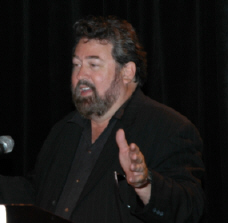The future in review


Anderson categorized the known world as a complicated place, which he said makes "predicting things and judging outcomes more difficult." Nonetheless, he judged that Japan is stuck in quagmire at same time it is launching great export companies like Toyota. Russia is going to be a great market for technology even with President Putin's move to centralize power. The European Union stability pact is dead and buried, Anderson said. France is developing broadband quickly and could get ahead of the U.S. quickly, and China and India are on tough roads to success.
Anderson is not a friend of the current administration's economic policy: "The global economic stability is threatened by the current economic team....aided and abetted by the fellow running the Fed [Greenspan]." His remark was supported to some degree by Robert Hormats (see below), vice chairman, Goldman Sachs (International) and managing director, Goldman, Sachs & Co. Nonetheless, Anderson is optimistic about technology. "There are more opportunities for companies to be created...more science being done in important areas, at the next step where computing merges with biology," Anderson said. "This is a moment in history when [computing and biology] are becoming equally complex and sharing a language with each other, with the potential for new inventions and cures."
"We should be saying what can we be doing to be more effective at home," Hormats said. He called the GI Bill, which provides education for soldiers, as the most important legislation in last 60 years because "it helped build the the strongest economy in world." It's up to the private sector, not the government, to deal with the current education problems.
Other imbalances he cited were the budget deficit, the low U.S. savings rate compared to Asian countries (China savings rate is 45 percent of GDP, and the U.S. is 1 percent of GDP) and the constrained energy situation. Regarding the budget deficit, Hormats offered the common wisdom that the government isn't doing what's necessary to pay for the war in Iraq. Taxes have been cut over the last four years, helping out wealthy Americans, and Congress has gone on a spending spree with lots of pork barrel for non-essential programs.
The budget deficit is being financed in part by foreign investment. Hormats said that $850 billion on a gross basis (mostly from Asia) of foreign investment went into buying U.S. bonds and other securities. Currently, 43 percent of all treasury bonds are owned by foreigners, investing conservatively and avoiding local banking systems and investing in their own countries. He said China is contemplating policy revision on its exchange rate, but won't do anything to compromise foreign investment and job creation in the country, which he said has 200 million floating workers.
Hormats expects the Federal Reserve to increase interest rates two or three more times to shrink consumption and make room to export more goods. He also expressed concern that American households with home equity loans and adjustable mortgages, combined with low savings rates, could suffer as interest rates go up and home values sag, causing a more dramatic slowing of growth in the U.S., especially with higher healthcare, education and energy costs.
The energy situation is not so much about shortages as tight capacity and that companies producing oil are subject to political disruption, as in Iraq and Venezuela. "We are seeing some but not much conservation as a result of higher prices, but it's a very slow process and vulnerable to disruptions for some time to come," Hormats said.
In concluding, Hormats said that as a nation we have to determine our real priorities and not try to do everything at once. He encouraged a more responsible debate on fiscal policy, raising the savings rate and investing in education.